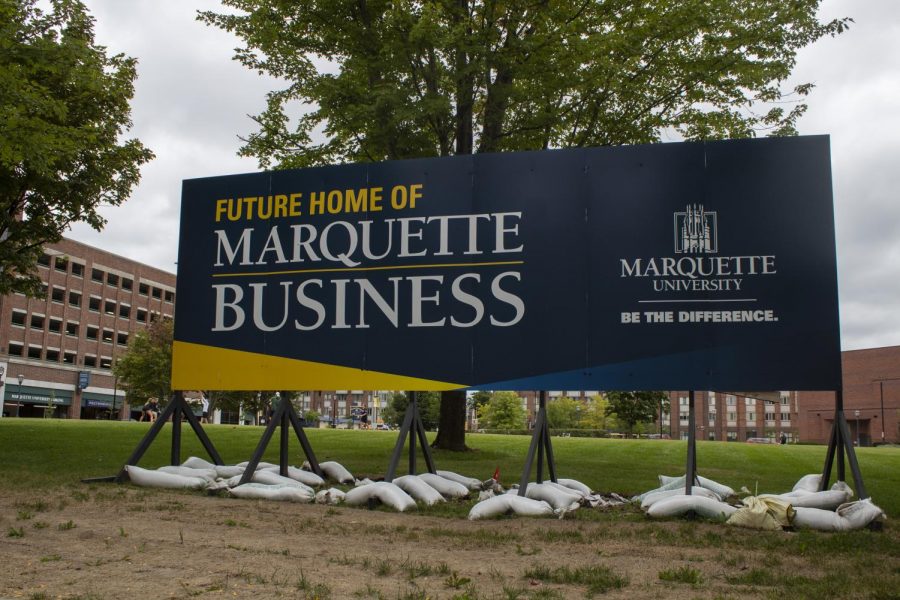Marquette does not have much to show for when it comes to sustainability. Unlike other universities, such as Loyola University Chicago, Marquette lacks a staffed sustainability office.
The university is looking to hire a Sustainability & Energy Management Coordinator, but the position has been vacant since last summer. On top of that, student groups such as Students for an Environmentally Active Campus and Fossil Free Marquette have taken initiative in lieu of the university’s efforts to make Marquette greener. These groups need more visibility and administrative support.
Marquette’s Jesuit mission inspires an obligation to care for others and the environment through sustainability.
One sustainability area that students have questioned is Marquette’s recycling efforts. The recycling page on Marquette’s Facilities, Planning and Management website includes two expired links: one to “a single-stream recycling program” and the other to “visit the Sustainability website.” While the Sustainability website does exist at a different web address, further information on the recycling program cannot be found on Marquette’s website.
Marquette needs to be more aggressive in implementation of green initiatives if it wants to achieve its sustainability goals by 2025, as described by the Marquette Purchasing Department. These four goals include specific targets in reducing emissions, waste and water consumption and increasing energy efficiency.
It is especially important that the university transitions into using more renewable energy sources to reach its goal of 25% reduction in greenhouse gas emissions. Switching to clean energy will help the City of Milwaukee execute its 25×2025 Renewable Energy Strategy, which aims to have 25% of the City’s energy come from renewable sources by 2025.
In comparison to other midwestern schools like Loyola University Chicago and Northwestern University, Marquette has put in a lot less work toward sustainability initiatives. According to Loyola’s Institute of Environmental Sustainability, they have reduced energy use on its Lake Shore campus by 18% since 2008. This reduction led to savings in energy costs that exceeded $6.2 million.
In 2019, Northwestern became the first university to win the United States Environmental Protection Agency’s 2019 ENERGY STAR® Partner of the Year Award two years in a row. It was recognized for achievements in areas like energy efficiency and its dashboard system that tracks utility consumption and makes energy usage transparent to the university community.
One positive example of sustainability on campus is the Opus College of Engineering, which sets a standard for future development at Marquette. Engineering Hall, completed in 2011, earned a Leadership in Energy and Environmental Design Gold Certification in 2013. It includes sustainable features like solar panels, a green roof, a rainwater storage system and an interactive display that shows data such as the building’s water and energy consumption.
Student groups like SEAC, Fossil Free Marquette and an emerging chapter of the Food Recovery Network at Marquette have taken matters into their own hands to make campus more sustainable. SEAC works to increase environmental literacy and organize campus and beach cleanups, and it helped advance the plan to bring composting to dining halls in 2016.
Fossil Free Marquette is a student-run campaign demanding that Marquette divest itself from fossil fuels and reinvest in renewable energy sources. In its petition addressed to University President Michael Lovell, the Board of Trustees and the Marquette Endowment Office, the group called on them to “freeze any new investments in fossil fuels and to divest from direct ownership and any commingled funds that include fossil fuel public equities and corporate bonds within 5 years.”
The Food Recovery Network is the largest student movement fighting food waste and hunger in America. Students involved in the organization at Marquette collect leftover food from Sodexo that would have gone to waste and partners with Marquette University Neighborhood Kitchens who delivers it to the Benedict Center.
Students at Marquette care about climate justice. Sustainable efforts on an institutional level can make a significant impact in the fight against climate change. The Marquette administration should respond to student concerns about the current and future state of our planet by making sustainability a priority on campus.
This story was written by Annie Dysart. She can be reached at anne.dysart@marquette.edu.







Judith Stadler • Feb 24, 2020 at 9:21 am
Thanks to Annie Dysart for this excellent summary of the status of sustainability at Marquette. I hope all readers have signed the Fossil Free Marquette petition in support of divestment from fossil fuels and investment in clean energy.